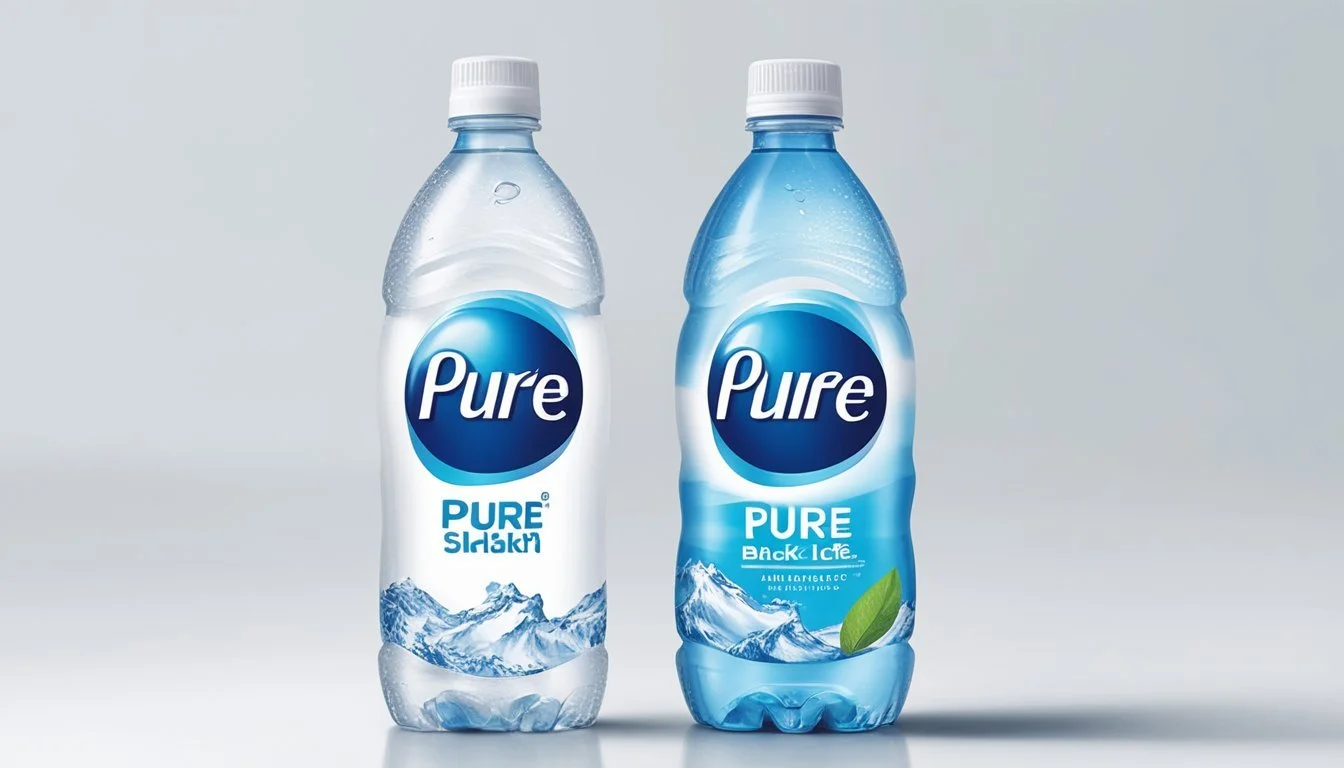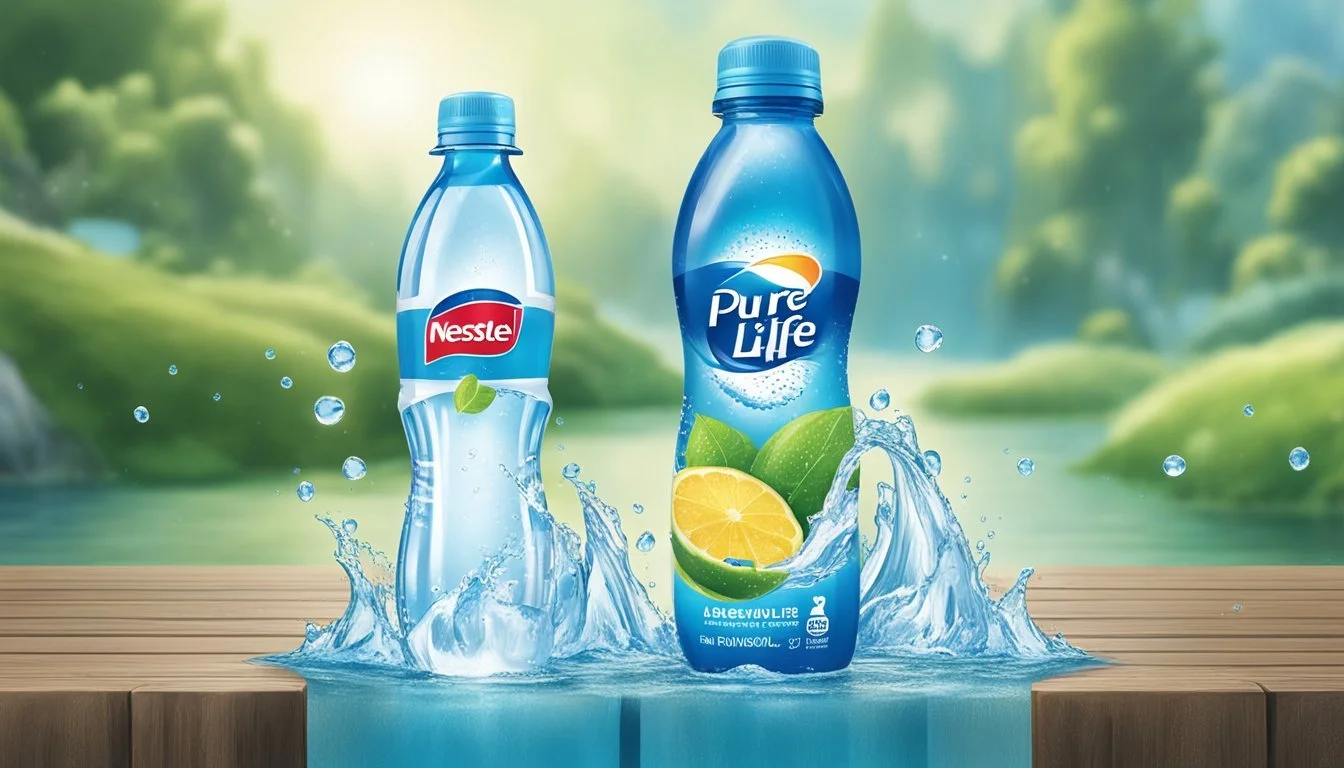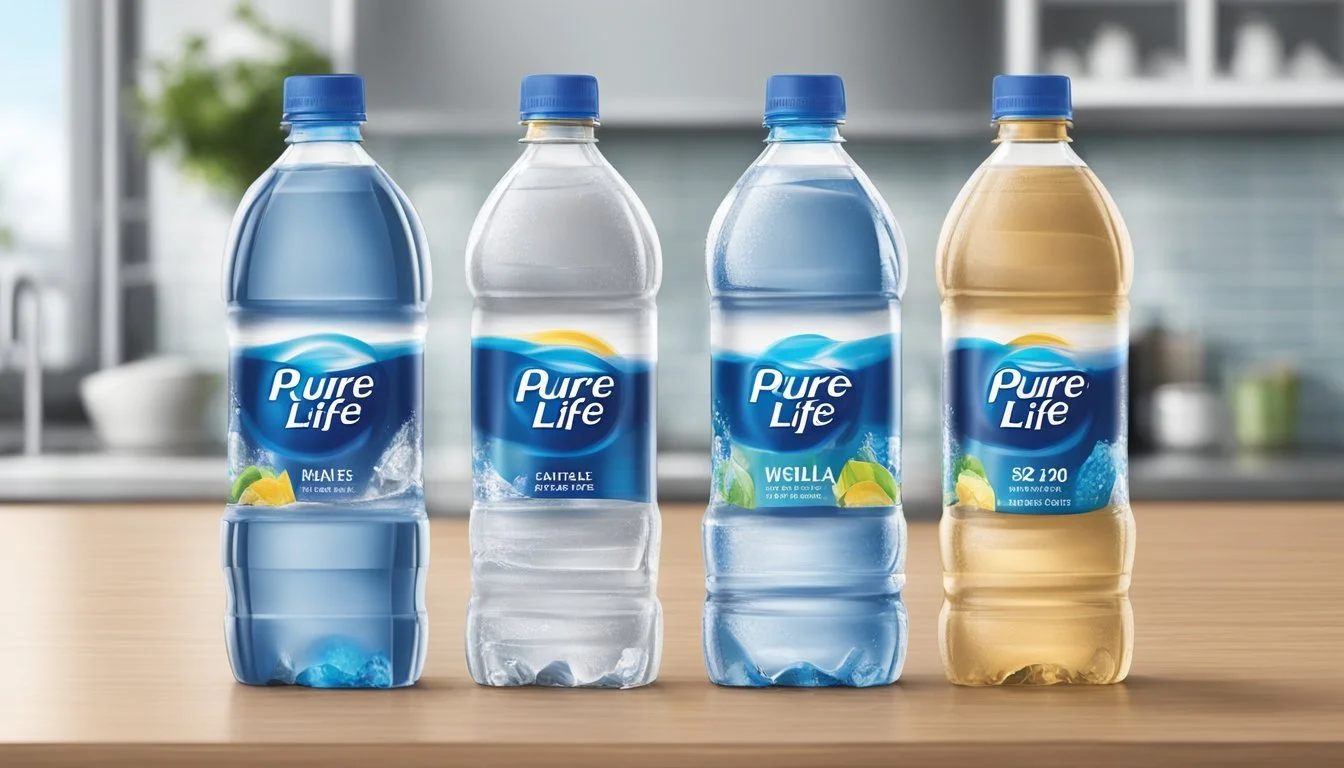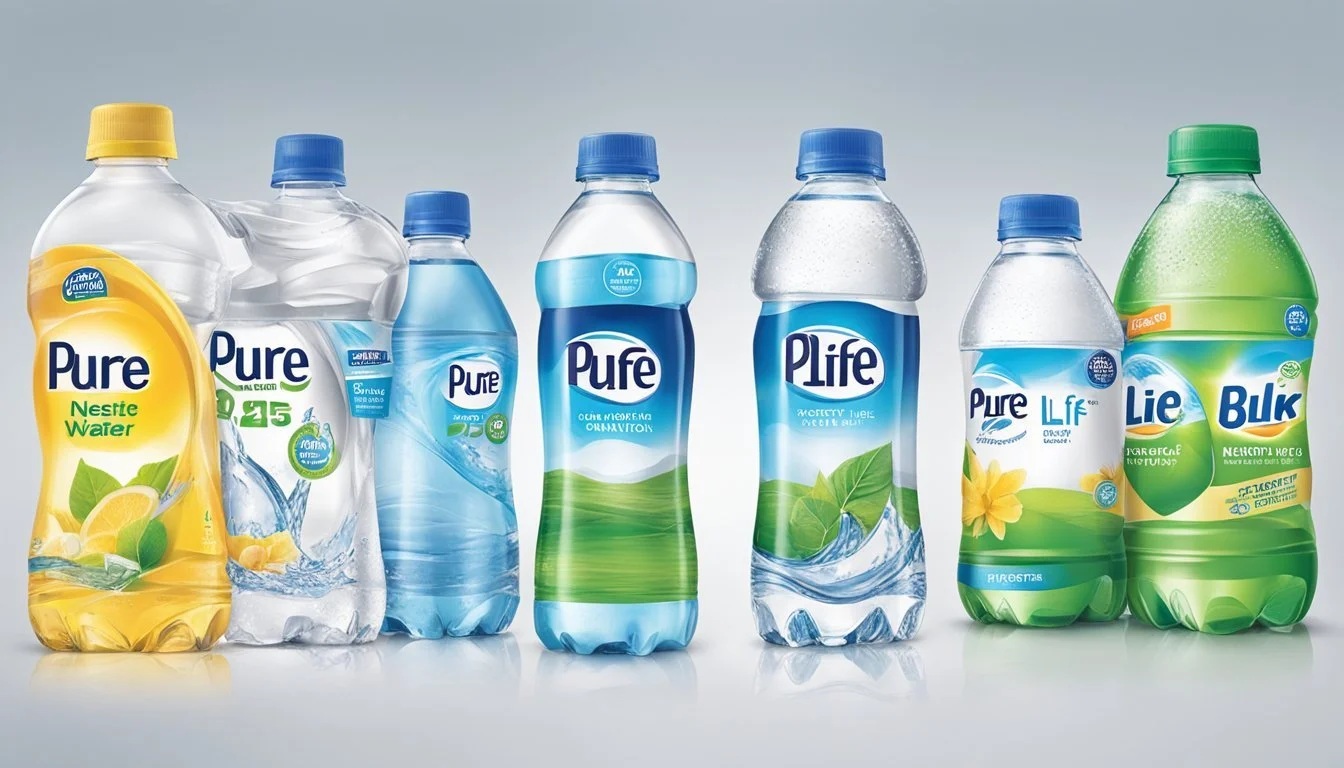Nestle Pure Life vs. Blk
Comprehensive Bottled Water Comparison
When it comes to choosing the best bottled water, two brands often make the shortlist: Nestlé Pure Life and Blk. Consumers are becoming increasingly conscious about the quality and source of their drinking water, and these two brands offer distinct differences that can sway a decision.
Nestlé Pure Life is a well-established brand known for its extensive reach and fan base. It is classified as purified water, meaning it undergoes rigorous processing to meet certain standards. It remains a popular choice due to its consistent taste and widespread availability.
In contrast, Blk offers a unique selling point with its black-colored water, enriched with fulvic minerals. For those looking for a hydration source that stands out both aesthetically and nutritionally, Blk provides an intriguing alternative to the conventional options available. This makes the comparison between Nestlé Pure Life and Blk not just about taste, but about what consumers seek in their daily hydration.
Understanding Bottled Water
Bottled water comes in a variety of types, each offering unique sources and compositions. This overview explains the different types available, the industry's landscape, and health-related aspects.
Types of Bottled Water
There are several types of bottled water available in the market. Spring water, sourced from natural springs, retains natural minerals. Purified water, like Aquafina, undergoes filtration processes such as reverse osmosis to remove impurities. Mineral water contains minerals like calcium and magnesium that are naturally present or added. Alkaline water, such as Essentia, boasts a higher pH level. Other specialty waters include artesian and distilled. Major brands like Fiji and Smartwater offer distinct attributes, from electrolytes to vapor distillation.
The Bottled Water Industry
The bottled water industry is vast and competitive. Major players include Nestlé, Coca-Cola (Dasani), and PepsiCo (Aquafina). The industry also features premium brands like Voss and Evian. The market ranges from budget options to high-end luxury brands. Factors influencing bottled water choices include sourcing, processing, and packaging. Companies often market the wellness benefits of their products, emphasizing purity, sustainability, and health benefits, attracting a diverse consumer base.
Health and Hydration
Health and hydration are pivotal when choosing bottled water. Some water brands, such as Smartwater and Essentia, add electrolytes to enhance hydration. Mineral water can supplement the diet with essential minerals. Conversely, purified water is ideal for those who prefer a neutral taste without minerals. Brands like Fiji emphasize a balanced mineral content, while others like Poland Spring promote natural purity. Understanding the specific benefits of each type can guide consumers towards better hydration choices.
Analyzing Nestlé Pure Life
Nestlé Pure Life offers various bottled water options sourced and treated for purity. Here's a closer look at its sourcing and filtration, quality standards, and taste profile.
Sourcing and Filtration
Nestlé Pure Life sources its water from both municipal supplies and well water. They emphasize rigorous filtration, utilizing processes such as reverse osmosis and carbon filtration to ensure the quality of the water.
After purification, minerals like magnesium, calcium, and potassium are added for taste and health benefits. The multi-step treatment aims to remove contaminants and heavy metals, ensuring safety and purity.
Quality Standards
Nestlé Pure Life adheres to strict quality standards. The water undergoes thorough testing to meet FDA regulations and EPA guidelines.
They perform regular checks for contaminants, including heavy metals like arsenic, cadmium, and beryllium, ensuring these remain within safe limits or are not detected at all. The 2021 water analysis report confirmed no harmful substances above permissible levels, affirming the brand's commitment to safety and quality.
Taste Profile
Nestlé Pure Life has a balanced, neutral taste. The added minerals, such as magnesium and calcium, enhance the flavor subtly without overwhelming the natural essence of water.
Some consumers prefer the clean and crisp taste, attributing this to the precise mineral blend and thorough filtration. While taste preference is subjective, Nestlé Pure Life's meticulous approach to filtration and mineral addition results in a refreshing drink suitable for daily hydration.
Evaluating Blk Water
Blk water is distinguished by its unique properties, health claims, and market positioning. Each aspect offers a different perspective on its value and effectiveness as a premium hydration option.
Unique Properties
Blk water is known for its dark color, derived from the fulvic trace minerals it contains. These minerals give the water its distinctive appearance, setting it apart from conventional bottled water.
The water is also alkaline, with a pH level of 8.0-9.0. This higher pH level is believed to contribute to better hydration compared to standard neutral pH water.
Additional properties include the absence of artificial sweeteners, preservatives, and other additives, ensuring a purely natural drinking experience.
Health Claims
Blk water is touted for its potential health benefits, largely attributed to the fulvic trace minerals. These minerals are promoted as boosting electrolytes and antioxidants, which may support better overall hydration and wellness.
Advocates claim that fulvic minerals can enhance nutrient absorption, improve digestion, and even support detoxification processes in the body.
The product's alkaline nature is also marketed as beneficial, potentially neutralizing acid in the bloodstream and supporting overall pH balance.
Market Position
Blk water occupies a premium segment in the bottled water market. Priced at $2-4 per bottle, it commands a significant price premium over more mainstream brands like Poland Spring.
The brand positions itself as offering luxury hydration, attracting consumers who are willing to pay extra for perceived health benefits and the unique drinking experience.
Despite its higher cost, Blk maintains a loyal customer base, drawn by its distinct branding and the allure of its purported health benefits. This strategic positioning helps Blk stand out in a crowded market.
Comparison of Nestlé Pure Life and Blk
Nestlé Pure Life and Blk offer different experiences in terms of water source, purification methods, aesthetic appeal, and environmental impact. Each brand caters to a distinct market segment, focusing on unique benefits.
Water Source and Purification Methods
Nestlé Pure Life sources its water both from municipal supplies and protected wells. The water undergoes rigorous purification, including reverse osmosis, to ensure purity. Filtration removes impurities and contaminants, making it safe for consumption.
Blk, in contrast, obtains its water from natural springs infused with fulvic and humic minerals. The filtration process for Blk retains these nutrients while eliminating harmful elements. This approach gives Blk its distinctive black color.
Nutritional Content and Benefits
Nestlé Pure Life is marketed primarily for its high purity and neutral pH. It contains minimal dissolved minerals, focusing on delivering clean and refreshing hydration.
Blk stands out for its rich mineral content. The fulvic and humic acids in Blk potentially offer health benefits, including enhanced nutrient absorption. Blk's pH level tends to be more alkaline compared to Nestlé Pure Life, which may appeal to consumers seeking alkaline water.
Taste and Consumer Preferences
Nestlé Pure Life is noted for its neutral taste, making it a popular choice for those who prefer water without any distinct flavor. Consumer preferences for Nestlé often highlight its refreshing and consistent taste profile.
Blk has a unique taste influenced by its mineral content. Some consumers appreciate the subtle earthy flavors, while others might find it less palatable. The aesthetic appeal of Blk—being black in color—also attracts a niche market looking for innovative products.
Price and Accessibility
Nestlé Pure Life is widely accessible and often available in bulk at competitive prices. This makes it a favorable option for households and individuals looking for cost-effective hydration solutions.
Blk is generally priced higher due to its unique branding and added minerals. It is also less widely available compared to Nestlé Pure Life, often found in specialty stores and online platforms.
Environmental and Sustainability Considerations
Nestlé Pure Life has faced criticism regarding its environmental impact, especially related to plastic usage and water sourcing practices. The company has made commitments to improve sustainability through better packaging and sourcing practices.
Blk markets itself as a more eco-friendly alternative, emphasizing sustainable water sourcing and environmentally friendly packaging. However, the smaller scale of production and niche market might limit its impact compared to larger brands like Nestlé.
Both brands offer different benefits and cater to varied consumer preferences, making the choice between them highly dependent on individual priorities and lifestyle.
Assessing the Impact on Consumers and the Environment
Examining the effects of Nestlé Pure Life and Blk bottled water on consumers and the environment reveals critical insights into sustainability, health considerations, and corporate practices.
Environmental Footprint
Nestlé Pure Life uses plastic bottles, contributing considerably to plastic waste and pollution. The production process requires significant oil use, adding to its carbon footprint. While recycling programs exist, the inefficiency of recycling processes often results in plastic waste entering landfills or oceans.
In contrast, Blk bottles are often made of PET plastic, a more recyclable material, but still contribute to environmental challenges. Both brands share the responsibility of reducing plastic usage and improving recycling rates to minimize their overall environmental impact.
Consumer Health Considerations
Nestlé Pure Life focuses on providing purified water, often sourced from municipal supplies and treated to remove contaminants. Despite being free from BPA, concerns about residual microplastics persist. The brand markets its hydration benefits, emphasizing safety and purity.
Blk distinguishes itself with its infusion of fulvic minerals, which it claims enhance water quality. These minerals reportedly offer additional health benefits, contributing to better hydration and nutrient absorption. However, consumers should verify these claims through independent research to ensure the health advantages outweigh any potential risks.
Corporate Responsibility
Nestlé Pure Life, as part of a major corporation, has faced scrutiny over its water sourcing practices and environmental sustainability efforts. Transparently reporting on its production and water sourcing is crucial for maintaining consumer trust. The company has initiatives aimed at reducing its carbon footprint and improving recycling rates but must continuously enhance these efforts.
Blk, while smaller in scale, promotes its focus on innovation and unique product offerings. Corporate responsibility for Blk includes sourcing fulvic minerals sustainably and ensuring transparent business practices around production and marketing. Both companies are urged to prioritize sustainable practices and transparent reporting to align with consumers’ growing expectations for corporate accountability.
Final Thoughts
When comparing Nestlé Pure Life and Blk, consumer preferences can vary based on several factors.
Quality is a key consideration. Nestlé Pure Life is known for its consistent purity, while Blk offers a unique mineral content due to its fulvic trace minerals.
Options for both water brands include various sizes and packaging forms, but they cater to different markets.
Some might argue that best water depends on individual consumer needs and tastes. While some prefer the familiar and crisp taste of Nestlé Pure Life, others might find the distinct qualities of Blk more appealing.
Nestlé Pure Life focuses heavily on providing accessible hydration with a wide distribution network.
Blk aims at health-conscious consumers seeking additional minerals in their water.
Understanding these differences can help individuals make an informed choice between Nestlé Pure Life and Blk.
More About Nestle Pure Life
Acqua Panna vs Nestle Pure Life: Which Bottled Water is Better?
Aquafina vs Nestle Pure Life: Which Bottled Water is Better?
Arrowhead vs Nestle Pure Life: Which Bottled Water is Better?
Boxed Water vs Nestle Pure Life: Which Bottled Water is Better?
Core Hydration vs Nestle Pure Life: Which Bottled Water is Better?
Deer Park vs Nestle Pure Life: Which Bottled Water is Better?
Essentia vs Nestle Pure Life: Which Bottled Water is Better?
Ice Mountain vs Nestle Pure Life: Which Bottled Water is Better?
Icelandic Glacial vs Nestle Pure Life: Which Bottled Water is Better?
Just Water vs Nestle Pure Life: Which Bottled Water is Better?
Mountain Valley Spring Water vs Nestle Pure Life: Which Bottled Water is Better?
Nestle Pure Life vs 1907water: Which Bottled Water is Better?
Nestle Pure Life vs 7-Select: Which Bottled Water is Better?
Nestle Pure Life vs Alkaline88: Which Bottled Water is Better?
Nestle Pure Life vs Antipodes: Which Bottled Water is Better?
Nestle Pure Life vs Aqua Carpatica: Which Bottled Water is Better?
Nestle Pure Life vs Big Chill: Which Bottled Water is Better?
Nestle Pure Life vs BodyArmor: Which Bottled Water is Better?
Nestle Pure Life vs Cascade Mountain: Which Bottled Water is Better?
Nestle Pure Life vs Castle Rock: Which Bottled Water is Better?
Nestle Pure Life vs CBD Living: Which Bottled Water is Better?
Nestle Pure Life vs Crystal Geyser: Which Bottled Water is Better?
Nestle Pure Life vs Crystal Lake: Which Bottled Water is Better?
Nestle Pure Life vs Essence pH10: Which Bottled Water is Better?
Nestle Pure Life vs Hawaii Volcanic: Which Bottled Water is Better?
Nestle Pure Life vs Hawaiian Springs: Which Bottled Water is Better?
Nestle Pure Life vs Kirkland Signature: Which Bottled Water is Better?
Nestle Pure Life vs Liquid Death: Which Bottled Water is Better?
Nestle Pure Life vs Mananalu: Which Bottled Water is Better?
Nestle Pure Life vs Open Water: Which Bottled Water is Better?
Nestle Pure Life vs Poland Spring: Which Bottled Water is Better?
Nestle Pure Life vs Proud Source: Which Bottled Water is Better?
Nestle Pure Life vs Pure Life: Which Bottled Water is Better?
Nestle Pure Life vs Purely Sedona: Which Bottled Water is Better?
Nestle Pure Life vs Refreshe: Which Bottled Water is Better?
Nestle Pure Life vs Richard's Rainwater: Which Bottled Water is Better?
Nestle Pure Life vs San Pellegrino: Which Bottled Water is Better?
Nestle Pure Life vs Simple Truth: Which Bottled Water is Better?
Nestle Pure Life vs Smartwater: Which Bottled Water is Better?
Nestle Pure Life vs Solan de Cabras: Which Bottled Water is Better?
Nestle Pure Life vs Talking Rain AQA: Which Bottled Water is Better?
Nestle Pure Life vs The Well: Which Bottled Water is Better?
Nestle Pure Life vs Topo Chico: Which Bottled Water is Better?
Nestle Pure Life vs Tru Alka: Which Bottled Water is Better?
Nestle Pure Life vs Weird Water: Which Bottled Water is Better?
Nestle Pure Life vs Whole Foods 365: Which Bottled Water is Better?
Nestle Pure Life vs Whole Foods Italian Still Mineral water: Which Bottled Water is Better?
Nestle Pure Life vs Zephyrhills: Which Bottled Water is Better?






